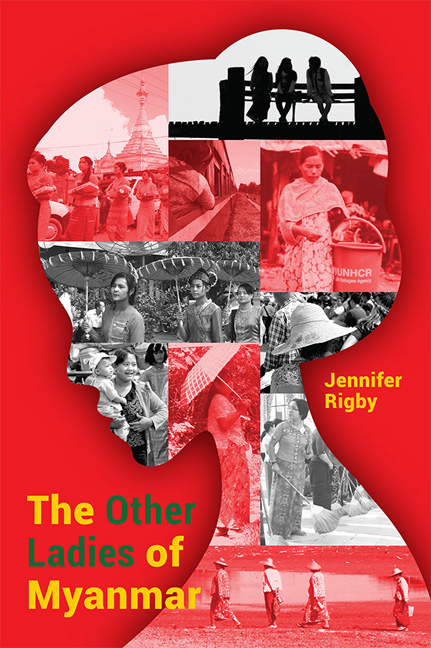Book contents
- Frontmatter
- Dedication
- Contents
- Preface
- Acknowledgements
- Introduction
- Timeline
- 1 The Activist: Cheery Zahau
- 2 The Feminist Buddhist Nun: Ketu Mala
- 3 The Survivor: Mi Mi
- 4 The Businesswoman: Yin Myo Su
- 5 The Environmental Campaigner and Princess: Devi Thant Cin
- 6 The Artist: Ma Ei
- 7 The Refugee Sexual Health Nurse: Mu Tha Paw
- 8 The Rohingya and Human Rights Champion: Wai Wai Nu
- 9 The Farmer: Mar Mar Swe
- 10 The Pop Star: Ah Moon
- 11 The Politician: Htin Htin Htay
- 12 The Archer: Aung Ngeain
- Conclusion
- About the Author
1 - The Activist: Cheery Zahau
Published online by Cambridge University Press: 08 June 2019
- Frontmatter
- Dedication
- Contents
- Preface
- Acknowledgements
- Introduction
- Timeline
- 1 The Activist: Cheery Zahau
- 2 The Feminist Buddhist Nun: Ketu Mala
- 3 The Survivor: Mi Mi
- 4 The Businesswoman: Yin Myo Su
- 5 The Environmental Campaigner and Princess: Devi Thant Cin
- 6 The Artist: Ma Ei
- 7 The Refugee Sexual Health Nurse: Mu Tha Paw
- 8 The Rohingya and Human Rights Champion: Wai Wai Nu
- 9 The Farmer: Mar Mar Swe
- 10 The Pop Star: Ah Moon
- 11 The Politician: Htin Htin Htay
- 12 The Archer: Aung Ngeain
- Conclusion
- About the Author
Summary
WHEN I first meet Cheery Zahau, she's pregnant with her first child, and so am I. She's about one month further along than me, and we share a little whine about morning sickness before she reassures me that it will get better soon, which is a lifeline I cling to for some time. I feel sheepish because while she had morning sickness, she travelled Myanmar interviewing youth groups and rape survivors, while I mainly stayed in my flat in the air conditioning, eating my way out of the nausea.
There's another coincidence too: both of our sisters are also pregnant. But that's where the similarities end, because a few months after we meet, her sister gives birth.
Her baby is healthy, but her experience is horrible, and it stems from the racism in Myanmar that Cheery has been fighting against her whole life. Cheery and her family are Chin, an ethnic group from the north of the country. Her people are no longer at war with the Burmese government, but they have been widely discriminated against for decades, and their region remains amongst the poorest and most neglected in a country where there is stiff competition for that miserable crown.
Cheery's sister had her baby in Yangon, where Cheery's family now live. First of all, the electricity went out, leaving her sister to deliver by torchlight for two hours. She was bleeding too much, cold and frightened, but there were no doctors to help. When Cheery went to find some doctors, she was told: “You Chin people, you all come in the labour room, are you bringing your whole nation here? You can't be here, get out.”
The next intervention from a medical professional came from a nurse, shouting: “Where is that Chin?” and handing Cheery a file. Hours later, when she was trying to stay because her sister (who speaks Chin but not Burmese) needed an interpreter, Cheery was told: “This hospital is not for those who can't speak.”
Cheery, shocked by the whole experience, wrote online: “Because of this type of people, I am disgusted [by] this country.”
- Type
- Chapter
- Information
- The Other Ladies of Myanmar , pp. 1 - 13Publisher: ISEAS–Yusof Ishak InstitutePrint publication year: 2018

